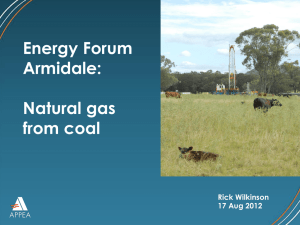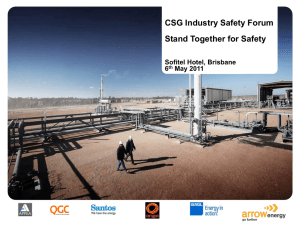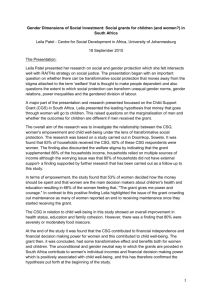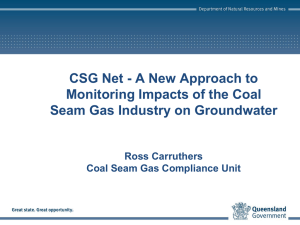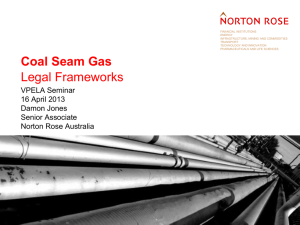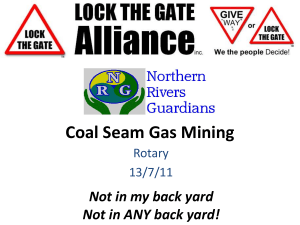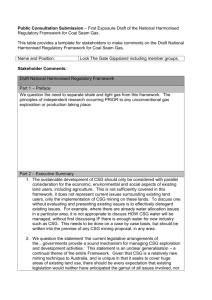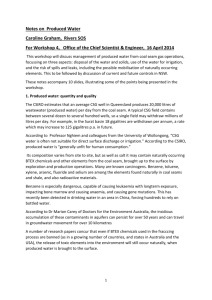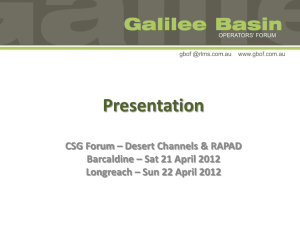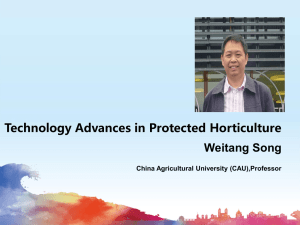Challenges for Queensland CSG and Mining
advertisement
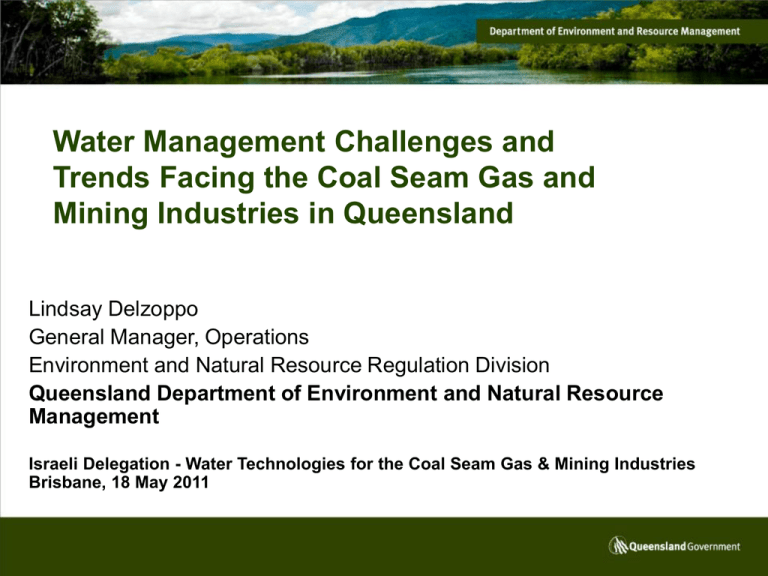
Water Management Challenges and Trends Facing the Coal Seam Gas and Mining Industries in Queensland Lindsay Delzoppo General Manager, Operations Environment and Natural Resource Regulation Division Queensland Department of Environment and Natural Resource Management Israeli Delegation - Water Technologies for the Coal Seam Gas & Mining Industries Brisbane, 18 May 2011 Outline of Presentation Current water management issues for Queensland Coal Seam Gas (CSG) - protection of groundwater resources - quantity and quality - desalination and use/disposal of treated CSG water - management of salts and brines - protection of soils, vegetation and biodiversity; - surface waters, world heritage values; noise; air; amenity Coal Mining - water supply sources - flood management - dewatering of flooded pits and storages Qld Water Links with Israel Water Expertise October 2007 – D-G of DERM, John Bradley, was member of a Trade Delegation to Israel to inspect water technology. Met Director of the Israel Water Authority, sharing information on: - recycled water policy - hydrologic risk analysis - climate change contingencies - desalination investment strategies - demand management and market reform. Current Key Water Management Issues Commission of Inquiry – Jan 2011 Floods. Environmental Recovery – Reconstruction. CSG Industry Water and Salt Management Second generation Water Resource Plans (allocations) & Environmental Values (water quality) Urban water security (drought/climate change) and water costs (water use efficiency) Coal Mine water management. Total rainfall 28 Nov 2010 – 17 Jan 2011 Wivenhoe Dam at 197% = 2.26 Million ML . Upper reaches of Wivenhoe Dam (<20%) in drought . The CSG Industry in Queensland Queensland Coal and CSG Production All named basins have current exploration Bowen Basin Surat Basin The Great Artesian Basin (GAB) A Typical CSG / LNG Project Hundreds of CSG wells in Surat or Bowen Basin gas fields Pumping of large amounts of slightly saline water (releasing pressure) from the coal seam releases adsorbed methane gas CSG water RO treatment plants, water re-use and disposal 300-400km gas pipelines from the gas fields to Gladstone Liquefied natural gas (LNG) plant on Curtis Island – export terminal containing LNG production and loading facilities (none built yet) Coal Seam Gas Fields . CSG Fields . CSG Water Extraction Groundwater extraction is an accepted, unavoidable, consequence of CSG extraction. 2010 – 2,700 wells 2015 – 10,000 wells 2025 – 30,000 wells CSG extraction could produce 125 - 280 GL /year Managing Impacts of CSG Extraction Great Artesian Basin (GAB), groundwater dependent ecosystems and water supplies to towns and landholders. Potential for aquifer recharge Preventing CSG water, brine and salts damaging the environment, water resources and soils. Reuse and disposal of treated CSG water Natural stream flow regimes Good quality agricultural soils Impacts on environmentally sensitive/conservation areas. Cumulative impacts of multiple CSG projects – including groundwater and surface water impacts. Key Principles of CSG Water Management - 2009 CSG producers responsible for disposal of CSG water Evaporation ponds to be discontinued as main means disposing CSG water Producers to treat water to a quality set by DERM CSG Water Management Plans approval stage with annual reporting against agreed criteria Adaptive approvals regime. CSG Water Policy - 2010 Preferred options for use of CSG water: aquifer injection (if matching quality) untreated use where no impact appropriate treatment and re-use for agricultural, industrial, potable purposes (now highly regulated0 Non-preferred options disposal via evaporation dams disposal to surface waters disposal to land Groundwater Regulatory Framework - 2011 Unlimited groundwater extraction is allowed under Petroleum and Gas Act 2004 Make good’ provisions for all water bores, groundwater dependent ecosystems and adjacent aquifers under the Water Act 2000 Clearly specified trigger thresholds for bores and springs QWC role to monitor and model the predictive and cumulative impacts of CSG activities and produce Underground Water Impact Reports Salt Management Hierarchy 1. Reuse to create useable or saleable salts or products 2. Inject brine underground when it can be demonstrated that there will be no adverse impacts. 3. Dispose to the ocean through pipelines - ensuring no local impacts. 4. Dispose of solid salt into a waste disposal facility. Salinity in Murray Darling Basin is a particular concern. Possibly 300,000 tonnes of salts per year (sodium bicarbonate, soda ash, table salt, caustic soda and calcium carbonate) Coal Mining Managing supply sources in drought Flood water management Dewatering of flooded pits, storages and tailings dams Protecting mine water impacts on aquatic ecosystems and drinking water supplies Environmental Regulation of Coal Mining in Queensland DERM regulates mines under Environmental Protection Act 1994 EIS undertaken for larger resource development projects Coal Mines have Environmental Authorities which set out: enforceable environmental performance requirements monitoring programs reporting requirements eb 2008 airn Dam owed flooding ald Department of Environment and Resource Management Ensham Mine Pre-flood Ensham Mine flood peak • Ensham Coal Mine most severely affected mine • 150,000 ML of trapped floodwater • Authorised discharge to the Nogoa River • Salinity increased as discharge continued • Domestic/drinking water supplies affected • Concerns over aquatic ecosystems impacts Department of Environment and Resource Management DERM Reviewed Performance of all Coal Mines in the Fitzroy Basin Key Recommendations: 1. Better, and more consistent environmental conditions needed for mine water discharges 2. Develop local water quality guidelines for the Fitzroy Basin 3. Develop models for assessing cumulative impacts across the Basin (IQQM). New Water Conditions for Coal Mines - 2009 Conditions largely based on protecting: Aquatic Ecosystems – 1000 EC downstream Drinking Water - 750 EC in receiving waters Minimum 1:4 dilution for mine discharges Release contaminant trigger investigation levels for metals Receiving Water Environmental Monitoring Plans Major flooding of Coal Mines in 2010-11 Monitoring data and conditions being refined in 2011 Queensland Mineral Exploration Expenditure by Mineral Sought - 2005 to 2010 90 80 WET 70 60 Coal GFC Selected base metals Copper 40 30 Gold 20 Total other 10 0 Ju n0 S 5 ep -0 D 5 ec -0 M 5 ar -0 Ju 6 n0 S 6 ep -0 D 6 ec -0 M 6 ar -0 Ju 7 n0 S 7 ep -0 D 7 ec -0 M 7 ar -0 Ju 8 n0 S 8 ep D 08 ec -0 M 8 ar -0 Ju 9 n0 S 9 ep -0 D 9 ec -0 M 9 ar -1 Ju 0 n10 $A Millions 50 Source: ABS (8412.0 - Mineral and Petroleum Exploration, Australia, Jun 2010) Conclusion Coal Mining and CSG Sectors in Queensland are large and growing – involving investments of many billions of dollars Sound water, wastewater and groundwater management is vital to the success of these sectors Sheer scale of mining and CSG activities presents opportunities for those with expertise in large-scale water and wastewater management and treatment Current Queensland Exploration and Development Activity 600 500 Coal (70 companies) 96 Minerals (258 companies) 400 42 300 200 89 473 315 100 260 19 76 0 Grassroots Exploration Advanced Exploration Feasibility Study Source: Intierra – September 2010
